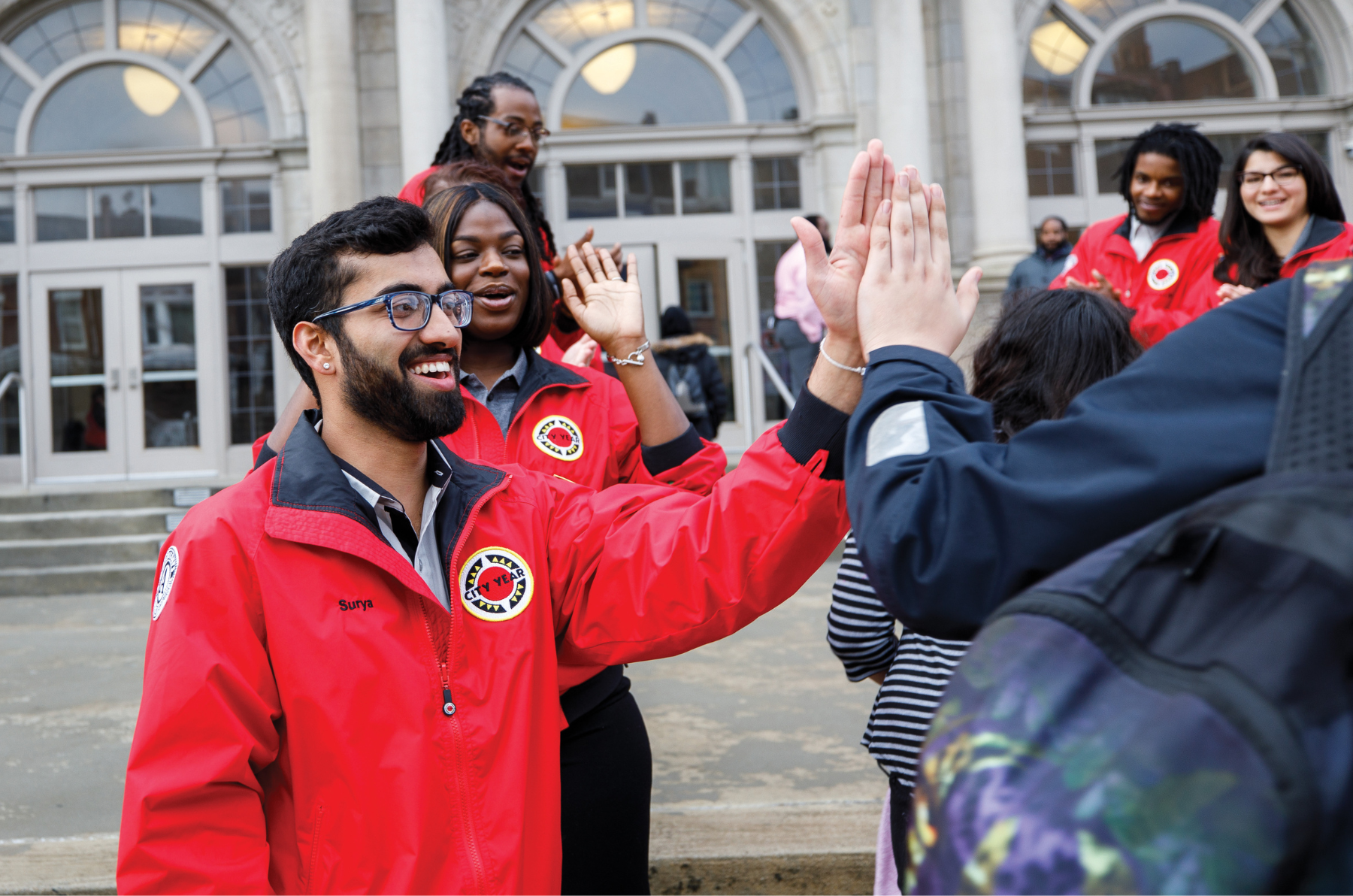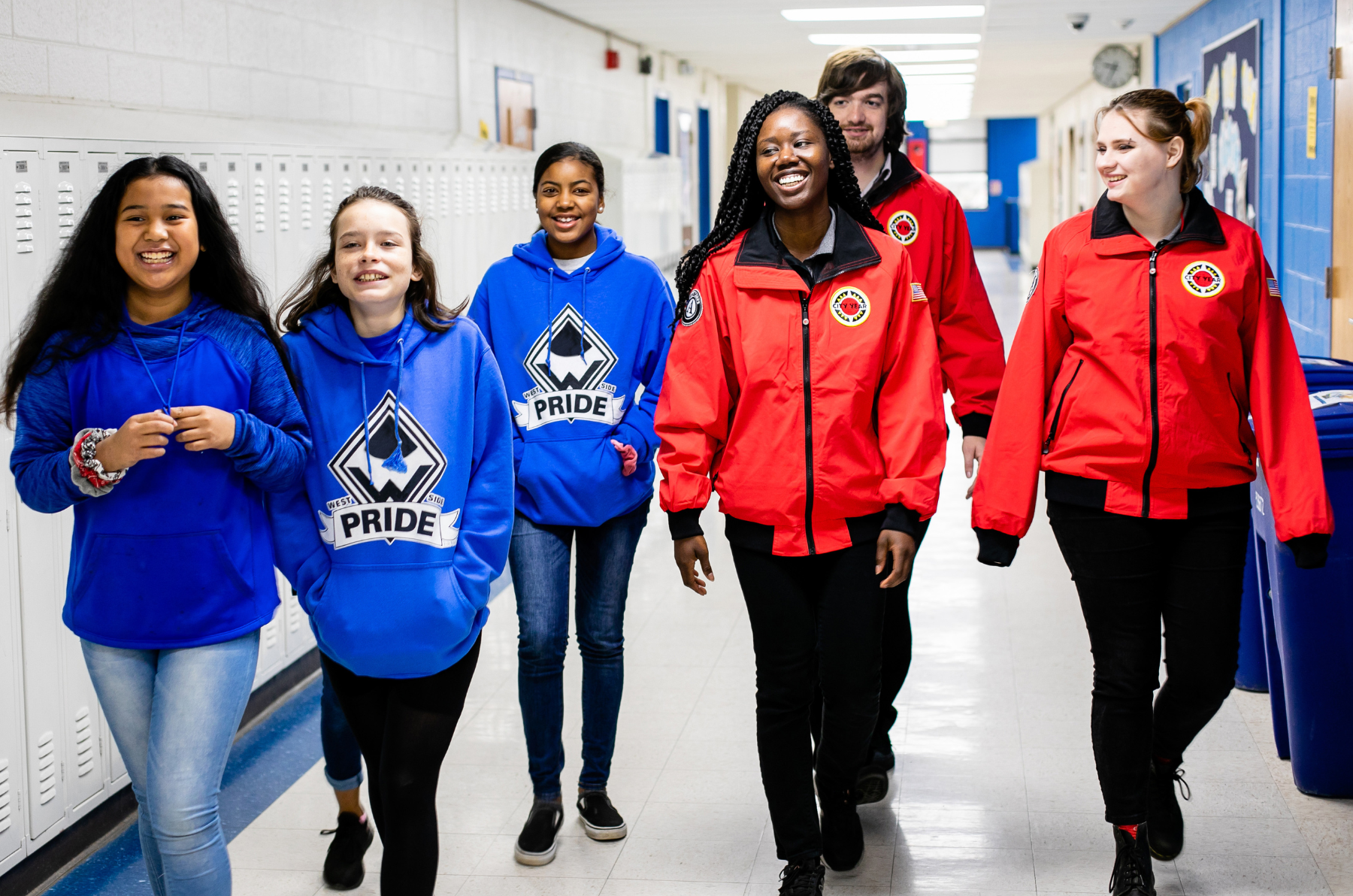Well-being Hub and Learning Spaces
Strengthening team and AmeriCorps Member mental health for greater meaning, connection, and impact in local schools.
Well-being Hub and Learning Spaces
Strengthening team and AmeriCorps Member mental health for deeper meaning, connection, and impact in local schools.
City Year partners with systemically under-resourced public schools in the United States, helping students succeed and creating nurturing school environments. More than 2000 AmeriCorps members play a major role by directly working with students and school systems through City Year. In addition, local staff teams mobilize daily to reach students across 29 cities in 21 states across the US.
While serving students is vitalizing and impactful, working in marginalized contexts can be extremely stressful. Since 2022, Brio has worked with City Year Headquarters to design well-being resources, training, and support so that individuals and teams can thrive in the midst of difficult and meaningful work.
What is the community’s story?
In the US, there is an immense need for more effective mental health skill-building – particularly in the stressful sector of social change, where burnout comes at a higher rate. Meanwhile young adults are experiencing a mental health crisis, with those between age 18-25 at high risk. While raising awareness and providing treatment are important, they alone are insufficient to meet the scale of this national challenge. Only when we work with leaders at the community and population level to build mental health skills for themselves and each other, will the tide begin to turn.
AmeriCorps Members, who are typically recent high school or college graduates beginning their careers, are critical to the social fabric of the communities where they serve. A large percentage of them come from marginalized communities themselves, with more than half of AmeriCorps members identifying as people of color and/or Pell-grant eligible. Furthermore, AmeriCorps Members who serve with City Year are responsible for supporting students who are struggling. Many witness the immediate impact of gun violence, institutional racism, job loss, and a lack of opportunity. Students turn to their AmeriCorps Member mentors for mental and emotional support. It is critical for AmeriCorps Members to experience their own stability and vitality so that they can offer it to the students they serve.
What is our partnership about?
Since 2022, Brio has partnered with City Year to strengthen well-being resources through designing well-being spaces, learning opportunities, and a new well-being resource platform. Centering the experiences of front-line AmeriCorps Members and impact teams, the well-being initiatives we co-created aimed to build sustainable personal practices and community cultures. Together with champions at City Year Headquarters, we co-designed the well-being approach and content to meet the needs of social change leaders, many who experience financial constraints. The conversations, trainings, and resource hub were all dedicated to helping corps members and staff integrate well-being into their daily work, offer support to each other, and connect to resources and benefits.




What is the impact so far?
For many individuals working in social change, the notion of well-being can feel trite or even self-indulgent. While many leaders in movement spaces are advocating for a shift from constant work toward healthy rhythms reclaiming rest and restoration, the mindset of self-exploitation and martyrdom is pervasive.
This narrative shift continues to unfold at City Year as leaders acknowledge that serving whole-heartedly and effectivley does not preclude personal or communal health and well-being. Participants of our trainings were excited about the broad applicability of the skills offered in well-being spaces and learning sessions. Well-being skills are not just about relaxing or feeling unaffected by life’s hardships; but navigating the complexity and change required of all of us to bring about the future we imagine to be possible.
Since 2022, Brio has worked directly with 50+ leaders within the City Year network to understand, design, and advance well-being initiatives across the organization. The result of these efforts has included
- A unique set of well-being spaces and team practices, informed by evidence and dedicated to City Year’s ethos
- Live and on-demand larning sessions for navigating well-being as an individual and as a team leader
- The new Well-being Hub platform, the go-to destination for the full range of well-being and mental health needs
Prioritizing well-being as an organization is easy to commit to in name and hard to implement systemically. City Year’s leadership team has championed this work for the past handful of years, and we’re excited to be a part of the ongoing evolution of workforce well-being.
%
AmeriCorps members reported an increase in their ability to navigate complex internal experiences
%
AmeriCorps members reported ability to be simultaneously aware of both their own and others’ experiences
%
AmeriCorps members reported an increased in their sense of community care
What have we learned?
Championing well-being requires collaboration and perseverance
Prior to working together, several leaders at City Year had begun exploring how mental health played a critical role in the retention and flourishing of AmeriCorps Members at City Year. Through initial surveys and listening studies, this team built the foundation for prioritizing well-being not only at schools and local sites, but also in their broader systems and culture.
When Brio began working with City Year, the foundation had been laid to do work around well-being in a way that felt accessible. Identifying where in the organization’s systems and processes to begin building well-being initiatives was critical. Furthermore, building a coalition of individuals at City Year to build momentum, share ideas, and test our programs was an immense lift.
Well-being narratives can change, even in large and complex organizations
Since beginning our partnership, we’ve witnessed team members and corps members coming to the realization that their own mental health and well-being mattered directly to the work they aimed to do everyday. This is an important shift— even as young adults continue to experience poorer mental health since Covid-19, it can feel like an immense problem to address as an organization. To do so, recognizing that there are both external systems changes needed, while building internal (psychological) skills and resources to respond to stress, were both critical mindset shifts that brought more individuals on board with the relevance of well-being in the social change sector.
With the new Well-being Hub as the destination for identifying and resourcing individual and team well-being, we’re excited for the thousands of individuals who can benefit from the offerings, practices, and change we’ve created together.
